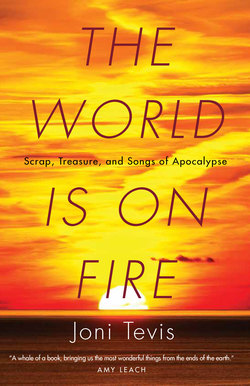Читать книгу The World Is on Fire - Joni Tevis - Страница 15
На сайте Литреса книга снята с продажи.
ОглавлениеTen Years You Own It
Salton Sea, California
Smears of heat rise from the car, the pavement, my sister’s head. I step out of the car and onto a dead fish, crushing its skull under my heel. The air’s so dry it shivers, the sun’s so strong that freckles pop like paint across my arms, and the stink—from tons of decaying fish—is making us all sputter and choke. The Salton Sea is the kind of place most people go out of their way to avoid. Not me. I’ve talked my family into coming here, all because of a photograph I’ve seen.
Tilapia can stand bad treatment—hotter water, higher salinity, more pollution—better than most fish, but sometimes the Salton Sea gets to be too much even for them. When that happens, they die off in huge numbers, sometimes as many as eight million a day. I walk down the beach with my family, all of us crunching tilapia underfoot. The fishes’ eyes go first, pecked out by ravenous shorebirds, but eventually all the fish transform from curled-up wholes to neat ladders of vertebrae to, finally, pearly piles of loose scales that lie scattered across the beach like bingo chips.
I lean over the water’s edge but don’t step in. The water itself is tea-dark, but its surface is as bright as tinfoil. Broken slabs of concrete and stubs of rebar jut underwater. We walk slowly past a row of abandoned house trailers, wrecked during the last of the big storms. Here’s a planed-open shower stall, a rusty oven with its door wrenched off, a shank bone from a big dog, probably a Lab. Here, washed up on the water’s edge, lies an empty pack of Skydancer cigarettes, a warrior in a headdress lifting his open palm to the pale-blue sky.
We were joking in the car, but that’s all evaporated now as we squint at the water, a little confused, a little sweaty. It’s eerie here, even at high noon, and I’m not sure why. This feels like a place located outside the bounds of normal time, like an amusement park, but we’re missing something. Calliopes and tin whistles: this beach is silent.
MIRAGE: 1958
Cue the music, coming to you live from an unseen band. Somewhere, some fellow sings, beyond the sea / Somewhere, waiting for me. The trumpets, nasally muted, swing along in the background, counterpointing the melody, propping it up. A drummer brushes the skins, and despite the terrific heat, everything is very, very cool. And you’re here to see it all: the sleek cigarette boats peeling the water open; the gulls flying past crinkled mountains; the platinum sun. The ice in your drink goes to water and you swallow it. When a breath of wind passes over your face you’re immediately grateful, as if heaven sent it particularly to you, just to see if you’d notice.
For thousands of years, Desert Cahuilla Indians lived here, watching the water come and go, and farming on these banks. But the Salton Sea’s current incarnation began as a mistake. In 1905, the Colorado River, which had been diverted to irrigate local agriculture, overcame its banks and poured full bore into the desert for two years, when engineers from the Southern Pacific Railroad finally blocked it with tons of riprap. The Alamo and New Rivers continue to drain into the Salton Sea, as does agricultural runoff from the Imperial Valley. Since 1909, the Torres Martinez band of Desert Cahuilla has held the title to ten thousand acres of land that lie on the bottom of the Sea.
In the mid-1980s, Richard Misrach shot a series of large-format photographs of the Salton Sea. These images, collected in Desert Cantos, are dangerous viewing for those with a certain bent: they’ll put a spell on you. Take this one, Diving Board, Salton Sea, of an empty swimming pool with a diving board and a flooded horizon receding to the vanishing point. The floodwater surrounding the pool is a strange, limpid blue, with a depth impossible to divine. I’ve gone back to the image again and again, trying to figure out why it haunts me. Partly it’s the story that the empty pool contains; what turned a resort into a ghost town?
But more than that, it’s something in the water. This is no ordinary sea, no ordinary sunset, and despite its calm surface, the water reminds me somehow of solvent, mercury thinned with gasoline. This is water with an opinion.
MIRAGE: 1902
The sun doesn’t do all the work, but it does what you can’t. You pour barrels of water into pools you’ve dug, then go round to tend the ones you set out yesterday and the day before. The sun licks the pools dry, like the fire of the Lord on Elijah’s offering, licking up the water on the altar and the water in the trough and the water soaking the wood, then the wood itself and the pieces of the sacrifice and the stones of the altar, cracked open in the flames. Sweat crawls down your neck as you rake these things over, turning the damp spread of new salt into neat piles. Pinch the stuff between your fingers and taste of it. Precious dust, come to you free, waiting in the desert like manna. Bow down in the sand, eyes shut from gratitude or knifelike sun. Nobody here to see you or ask why.
